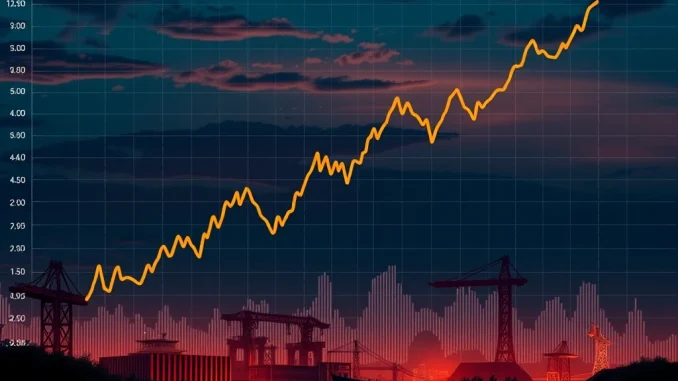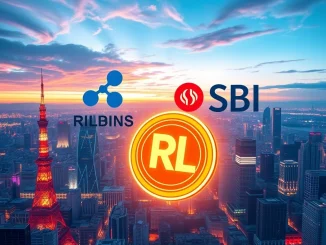
Hold onto your hats, crypto enthusiasts! The global markets just experienced a tremor, and it’s sending ripples across the financial landscape. The Nikkei 225, a key indicator of the Japanese economy and a bellwether for global markets, has just taken a nosedive, plummeting a staggering 8.53%. This dramatic Nikkei Drop comes hot on the heels of news that Japanese Prime Minister Shigeru Ishiba is set to discuss tariffs with U.S. President Trump. Is this just a blip, or are we witnessing the beginning of a larger Global Market Shockwave? Let’s dive into what’s happening and what it could mean for you, the crypto investor.
Why is the Nikkei Plunging? Unpacking the Tariffs Impact
The immediate trigger for this market turbulence appears to be the upcoming discussions between Prime Minister Ishiba and President Trump regarding tariffs. Tariffs, in essence, are taxes imposed on imported goods. While they might seem like a simple trade tool, their impact can be far-reaching and complex. Here’s a breakdown of why tariffs are causing such concern:
- Trade Wars and Economic Uncertainty: Tariffs are often seen as the opening shots in trade wars. When countries impose tariffs on each other’s goods, it disrupts established trade relationships. This creates significant Economic Uncertainty for businesses. Companies become hesitant to invest, expand, or even maintain current operations when they don’t know the future cost of importing or exporting goods.
- Increased Costs for Businesses and Consumers: Tariffs directly increase the cost of imported goods. Businesses that rely on imported materials or components face higher production costs. These increased costs are often passed down to consumers in the form of higher prices for goods and services. This can lead to inflation and reduced consumer spending.
- Impact on Corporate Profits: For companies that export goods, tariffs imposed by other countries can make their products less competitive in international markets. This can lead to decreased sales, reduced profits, and potentially job losses. The fear of reduced corporate profits is a major driver of stock market declines like the current Nikkei Drop.
- Global Supply Chain Disruption: Modern economies are built on intricate global supply chains. Tariffs can disrupt these chains, forcing companies to find new suppliers, relocate production, or absorb higher costs. This disruption adds to Market Volatility and can negatively impact overall economic efficiency.
In the case of Japan and the U.S., any discussion about tariffs is particularly sensitive. Japan is a major exporting nation, and the U.S. is one of its most important trading partners. The prospect of new tariffs raises fears of a significant negative impact on the Japanese economy, hence the sharp reaction in the Nikkei.
Nikkei’s 8.53% Plunge: A Deeper Dive into the Numbers
An 8.53% drop in a major stock market index like the Nikkei is not just a minor fluctuation – it’s a significant event. To put this into perspective:
| Metric | Value |
|---|---|
| Nikkei 225 Previous Close | (We would need to look up the previous day’s close to calculate exact figures, but for context, let’s assume a hypothetical value) |
| Nikkei 225 Current Value | 30,899.70 |
| Percentage Drop | 8.53% |
| Points Lost | (Approximately calculate points lost based on a hypothetical previous close and 8.53% drop) |
This massive single-day drop indicates strong investor concern and a rush to sell off Japanese stocks. It reflects a loss of confidence in the near-term prospects of the Japanese economy and potentially the global economy as a whole. The speed and magnitude of the Nikkei Drop amplify the sense of urgency and Global Market Shockwave.
What Does This Mean for the Crypto Market?
You might be wondering, “Why should I, as a crypto enthusiast, care about the Nikkei?” The truth is, traditional financial markets and the cryptocurrency market are becoming increasingly interconnected. Events in one market can and often do spill over into the other. Here’s how the Tariffs Impact and the Nikkei Drop could affect the crypto world:
- Risk-Off Sentiment: When traditional markets experience significant Market Volatility and downturns like the Nikkei Drop, investors often adopt a “risk-off” approach. This means they tend to move away from assets perceived as risky, such as stocks and, yes, cryptocurrencies. This risk aversion can lead to sell-offs in the crypto market as investors seek safer havens like government bonds or cash.
- Correlation and Market Sentiment: While the correlation isn’t always perfect, there’s an increasing tendency for crypto markets to mirror the sentiment of traditional markets. A negative event like the Nikkei Drop can create a general atmosphere of fear and uncertainty across all markets, including crypto. This negative sentiment can drive down crypto prices, at least in the short term.
- Opportunity in Volatility: On the flip side, Market Volatility also presents opportunities for savvy crypto traders. Sharp market swings can create chances to buy low and sell high. Experienced traders might see the Nikkei Drop and the resulting uncertainty as a chance to capitalize on potential dips in crypto prices. However, this requires careful analysis and risk management.
- Long-Term Economic Concerns: If the Global Market Shockwave triggered by tariff discussions escalates into a broader global economic slowdown, it could have longer-term implications for all asset classes, including crypto. A recession or significant economic downturn could impact investor appetite for both traditional and digital assets.
Navigating Economic Uncertainty: Actionable Insights for Crypto Investors
So, what should you do as a crypto investor in the face of this Economic Uncertainty and Global Market Shockwave? Here are some actionable insights:
- Stay Informed: Keep a close watch on global economic news and market developments. Pay attention to updates on the tariff discussions and their potential impact. Understanding the broader economic context is crucial for making informed crypto investment decisions.
- Diversify Your Portfolio: Diversification is key in times of volatility. Don’t put all your eggs in one basket. Consider diversifying your investments across different asset classes, including both crypto and traditional assets, to mitigate risk.
- Manage Your Risk: Be mindful of your risk tolerance. Avoid making impulsive decisions based on fear or panic. Consider using risk management tools like stop-loss orders to protect your capital during periods of high Market Volatility.
- Do Your Own Research (DYOR): Never rely solely on news headlines or social media hype. Conduct thorough research on any crypto projects you are considering investing in. Understand their fundamentals and long-term potential.
- Think Long-Term: Remember that market downturns are often temporary. Focus on the long-term potential of the crypto market and avoid being swayed by short-term fluctuations. If you believe in the long-term value proposition of cryptocurrencies, periods of Market Volatility can even be seen as buying opportunities.
The Road Ahead: Will the Shockwave Subside?
The Nikkei Drop serves as a stark reminder of the interconnectedness of the global economy and the potential for Tariffs Impact to trigger significant Market Volatility. While the immediate cause is the anticipation of tariff discussions, the underlying issue is the broader Economic Uncertainty in the global trade landscape.
Whether this Global Market Shockwave will subside quickly or escalate further remains to be seen. Much will depend on the outcome of the discussions between Prime Minister Ishiba and President Trump, and the broader global trade environment. For crypto investors, staying informed, managing risk, and maintaining a long-term perspective are crucial in navigating these turbulent times. The crypto market, while volatile, also presents unique opportunities in the face of global economic shifts. Keep your eyes on the horizon, and remember – volatility can be your friend if you’re prepared.



